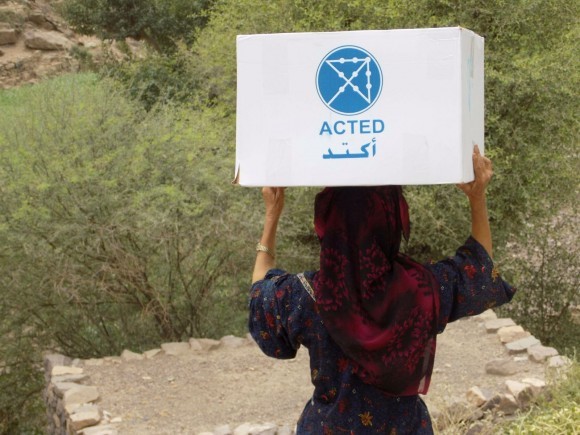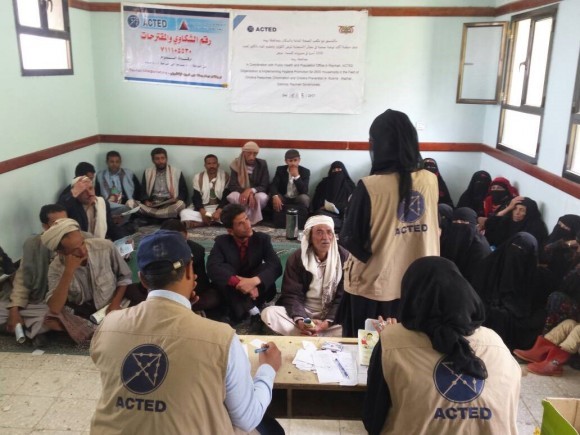Ibb – December, 2017 Adeeba* 42, is from AlMakhadir district, Ibb governorate. She is the head of a family of eight people.
These days, her main problems and challenges are to find food, to be able to eat and to find water to drink, therefore, she does not focus on their quality.
“We were not that much aware about the importance of washing our hands frequently or sterilising water”, explained Adeeba. She added, “we thought that we were immunized and that water couldn’t harm us”. Adeeba mentioned that they did not regularly clean the jerry, “unless we noticed something dirty within it.” Cleaning entailed washing the can out with water only and there was no distinction made regarding how jerry will be use, for drinking or washing.
“[The jerry cans] all seem as clean to us.”
Hazim*, 48, who is living in AlMakhadir has been affected when one of his son was infected by cholera. According to Hazim, the reason is the inability to offer his family the essentail items for a proper and healthy life. He explained the situation by “the finnancial difficulties in the country during the conflict and the collaps of all officially provided services.”
In order to contain and prevent the spread of cholera in affected areas, ACTED partnered with OCHA to implement a dual community and household level emergency response, in order to improve the water supplies and hygiene environments in homes and in health facilities.
ACTED targeted households in Raymah, Al Dhale’e and Ibb communities, reaching 2,500 households with cholera prevention kits, cholera awareness sessions, and water treatment practices training. If a location with a confirmed case of cholera has a population of less than 500 households, ACTED will conduct distributions of cholera kits.
These cholera prevention kits contained a supply of aquatabs, which are tablets of chlorine to be put into water containers, soap, jerry cans, and laundry detergent powder. A single kit is designed to last a household of seven for three months, which enables households to focus on meeting other critical needs.

After reciving the cholera kit and attending hygiene and cholera awareness sessions, Hazim personally followed up with his family. He ewplained them the processes to wash their hands, to bring water and to store it. He mentioned that bringing water is still the task of women, by tradition and that it is rare to see men doing it. For Hazim, taking care of this process “is the matter of saving life.”
Adeeba also pointed out the hard process of bringing water from well to home, which is the responsibility of women from two to three times per day. The well is 2 kilometers away from their house. In winter, when well water is sometimes inaccessible, they have to go the as far as 5 kilometers to find water.
For Adeeba, the cholera kit helps them a lot, as it contains washing materials that she cannot currently provide for her family on a consistent basis. “The kit means that we will not have to buy cleaning materials for three months,” Adeeba said, adding, “this is a great financial help.”
Distributions of kits were accompanied with pictorial and oral instructions, covering key cholera messages. It explained the proper dosing of Aquatabs, the procedures for safe transport, handling, and storage of water; and focused as well on disinfection of household water storage containers (jerry cans), the risks of contamination via jerry cans or other household water containers and included jerry cans cleaning campaigns. All distributions were also paired with a regular water quality spot checks for free residual chlorine (FRC) at the household level.
Mohsen mentioned that he will make sure that jerry cans are cleaned daily and that the water jerry cans are seprated from washing jerry cans and that they are getting a more specific and more carful treatment.
Moreover, the awarness sessions taught Hazim to not only observe the proper practices for him and his family at home, but to also to be aware of the cleanliness of the environment around his house. “There is no sanitation services and the government services often cannot provide clean water, sanitation, or solid waste management.”
“The distribution of the kit and the cholera prevention awareness session change a lot of my thoughts about what should be and what are the best practice to apply” Mohsen said, adding, “it taught me how thing could be changed when more concerns and acts are applied.”
* Name has been changed to protect the identity of the beneficiary.
